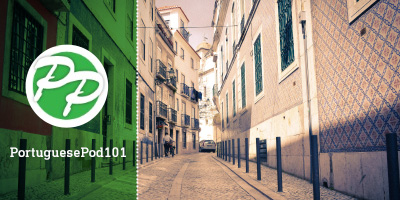How to Say “Hello” in Portuguese: “Olá!” (plus 15 More Ways!)
Planning on visiting a Portuguese-speaking country? Got a Portuguese friend, a Brazilian colleague or an Angolan love interest that you'd like to impress? Or do you just want to learn some basic Portuguese for the fun of it? An obvious and essential first step is to learn how to say “hello” in Portuguese.
Like all languages, Portuguese has many different ways to greet people (and say goodbye to them), to introduce yourself and to exchange basic pleasantries. We'll cover all the most important phrases below.
Olá – “Hello” in Portuguese
Olá is the simplest, safest way to say “hello” in Portuguese, both European and Brazilan. It sounds like the Spanish hola, except with hola the first syllable is stressed (OH-la), but with olá you stress the second syllable (oh-LA). In fact, that's why “olá” is written with an accent on the “a” – an acute accent (á) or a circumflex (â) always indicates a stressed syllable in Portuguese.
Oi – “Hi” in Portuguese
Oi is a casual, informal way of saying “hi” in Portuguese. It's especially common in Brazil but is becoming more and more widespread in Portugal as well.
Note that if you say oi with a flat tone, it means “hi”. If you say it with a rising tone – oi? – it's like saying “what?”; you're asking the speaker to repeat themselves.
Want to learn Portuguese fast? Then check out our favourite Portuguese course, PortuguesePod101. It includes fun, easy to follow lessons on Portuguese greetings.
Bom dia – “Good morning” in Portuguese
Bom dia literally means “good day” in Portuguese, but you'd only use it to say “good morning”. The literal translation of “good morning” in Portuguese would be boa manhã, but this is never used.
Note that Brazilians pronounce dia differently from Portuguese people; the former says “JEE-ah” while the latter says “DEE-ah”.
Boa tarde – “Good afternoon” in Portuguese
To say “good afternoon” in Portuguese, use boa tarde. Portuguese doesn't really distinguish between the “afternoon” and the “evening” like we do in English. The distinction between those two words can be kind of blurry in English anyway. Is there a fixed, unambiguous time every day when the afternoon ends and the evening begins?
Boa noite – “Good night” in Portuguese
In Portuguese the rules are clear: the period from midday until 7pm is the tarde, then after 7pm it’s the noite. So in Brazil, where the length of the day hardly changes all year, you might greet someone with boa noite (good night) as early as 7pm, which isn't really considered “night-time” in English.
A Note on Portuguese Greetings
In English, “good morning” and “good afternoon” are only really used as greetings, while “good night” is what you'd say to someone at the end of the day right before they go to bed.
The Portuguese equivalents, however, are much more versatile – bom dia, boa tarde and boa noite can all mean both “hello” and “goodbye” in Portuguese. Just make sure you use the correct phrase for the current time of day!
Alô – “Hello” in Portuguese (On the Phone)
Alô, borrowed from English, means “hello” in Portuguese. However, it's only used in one very specific situation – you say alô? when you're answering the phone.
You can also say alô? mid-phone-conversation on the phone if the line starts cutting out and you're having trouble hearing each other. It's like saying “are you there?” or “can you hear me?”
Tchau and Adeus – “Goodbye” in Portuguese
We've covered how to say “hello” in Brazilian Portuguese, but what about “goodbye”? The most common way to bid someone farewell in Brazil is tchau, pronounced like the Italian ciao (which of course is where it comes from.)
Note that, while ciao in Italian can mean both “hello” and “goodbye”, in Portuguese it exclusively means “goodbye”. Also note that tchau is sometimes written as xau.
Portuguese people say tchau as well, but they can also say adeus, literally “to God”. While Brazilians are familiar with adeus, to them it sounds very formal, and has strong connotations that you're never going to see the person again – so it's rather dramatic! In Brazil, stick with tchau.
Como vai? or Como estás? – “How’s it going?” or “How are you?” in Portuguese
So you've met someone and you've successfully greeted them. Social convention dictates that the next step is to ask them how they are.
There are many ways to accomplish this. Two of the most common are como vai? (lit: “how does it go?”) and como estás? (lit: “how are you?”). You can reply to either with a simple estou bem (I'm good) or just bem.
Remember that there are two ways of saying “you” (in the singular) in European Portuguese. Estás is the tu form of the verb estar, and is considered informal, while in formal situations you'd use está (the você form). In Brazil, the tu form of verbs is never used; Brazilians say está in both formal and informal situations.
Tudo bem? and Tudo bom? – “Everything good?” in Portuguese
These two expression both mean “everything good?”. Idiomatically, they serve the same purpose as como vai? or como está?. Bem means “well” while bom means “good”, but in this context, the two terms are used interchangeably.
So what's the difference? When should you use tudo bem and when should you use tudo bom? The answer: if you're the first person to speak, it doesn't matter. Say tudo bem? or tudo bom?; either is fine.
The part that requires you to think (but not very much) is when you reply. Don't worry, the rule is simple. Just respond with the opposite phrase. So if someone asks you tudo bem?, you reply with a tudo bom. If they say tudo bom?, you say tudo bem. Or, in either situation, you could just reply with a simple tudo – “everything”!
How to Get Someone's Attention in Portuguese
Suppose you haven't said olá yet, because the object of your attention hasn't noticed you, or doesn't realise that you want to talk to them. A safe, polite way to get their attention is to say licença (lee-SAYNG-suh). A cognate of the English word “license” (and it can mean that, too), licença basically means “excuse me?”.
Another common way to get someone's attention in Brazil is moço (said to a man) or moça (said to a woman.) This word is hard to translate; it roughly means “young man/woman”, or perhaps a less formal version of “sir” or “madam”. It's the kind of thing you might say to a waiter, a staff member in a shop, or a stranger on the street, as an alternative to licença.
Another use of licença is if you're pushing through a crowd or someone is otherwise blocking your way, and you'd like to politely ask that they step aside.
Bem-vindo – “Welcome” in Portuguese
Bem, as mentioned above, means “well”. Vindo is the present participle of the verb vir, “to come”. So put them together and you get… “welcome”, of course!
The one thing to be aware of is that you can't say bem-vindo to everybody. The ending needs to change depending on whom you're speaking to. In this respect, it follows the usual rules for Portuguese endings: say bem-vindo to a man, bem-vinda to a woman, bem-vindas to a group of women, and bem-vindos to a group of men or a mixed group.
How to say “my name is” in Portuguese
So you've got someone's attention, said hello, welcomed them, and asked them how they are, but you may be missing an important detail: what's the other person's name?
To ask, say qual é o seu nome – “what's your name?”
How to respond if someone asks you the same question? You can say sou (NAME) (“I'm NAME”) or me chamo (NAME) (“My name is NAME”, literally “I call myself NAME”).
Remember that in Portuguese you usually use the definite article “o” (for males) or “a” (for females) when referring to someone by name. So if your name is Gabriel, you actually say sou o Gabriel (“I'm the Gabriel”), while Fernanda would say sou a Fernanda (“I'm the Fernanda”.) It's weird from an English speaker's point of view, but you get used to it.
Prazer – “Nice to meet you” in Portuguese
There's one last pleasantry that you must know. After exchanging introductions with somebody, it's customary to say prazer. This literally translates as “pleasure”, and it's the standard way to say “nice to meet you” in Portuguese.
When prazer won't cut it, try saying muito prazer – “very nice to meet you!”




Social